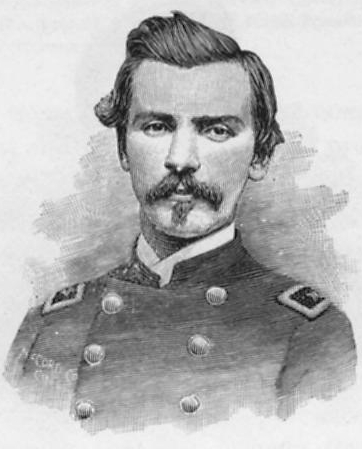
Learning from Gettysburg:
Rufus Dawes, 6th Wisconsin(A recent video captured the bloody action described below. It’s a powerful realistic portrayal of the 6th Wis charge of the railroad cut on July 1st. Here’s the link, but it comes with a warning–it’s bloody and hard to watch. https://www.youtube.com/watch?v=ikFeQUMxIOI)
“Align on the colors! Close up on the colors!” Rufus Dawes yelled. It was the only order that could hold his regiment together, the old Sixth Wisconsin. Joe Davis’ brigade of Mississippians and North Carolinians had already turned Cutler’s Brigade, threatening to throw the Union 1st Corps off the McPherson Ridge defenses. Dawes’ decision to charge across 200 yards of open field toward the railroad cut stopped the Confederate flanking effort—embarrassing Jefferson Davis’ nephew.
By capturing the flag of the 2nd Mississippi, along with 100s of Confederates, the 6th Wisconsin added insult to injury—but not without cost.
A few days later, Dawes wrote his wife, “O Mary, it is sad to look now at our shattered band of devoted men. 30 men killed outright, 116 wounded, 25 missing—all from the 340 I took into battle. I have no opportunity to say more now or write to anyone else. Tell mother I am safe. God has been kind to me, and I think he will spare me. I could tell a thousand stories of my men’s heroism.”
The Power of Community, of Holding Together
Dawes put it down to grim experience. “There is not with our men the headlong recklessness of new men … but there is a conviction from much experience in fighting, that safety is best had by steadiness, persistence in firing, and most of all by holding together. So, with the inducement of pride, duty, patriotism and personal preservation, they will stand together until the last.”
The Honoring of Memory and the Cause of the Humblest
Years later, Dawes, a Congressman from Ohio, visited Arlington Cemetery on a beautiful sunny day and “worshipped at the shrine of the dead.” He found and visited the 24 graves of men who died under his command.
He later wrote his wife:
December 18, 1881,
My Dear Wife, I went over to the Arlington Cemetery. It was a beautiful morning and the familiar scenes so strongly impressed upon me during my young manhood were pleasant. Many times I went over that road, admiring the beautiful city and great white capital, with its unfinished dome, going to hear the great men of that day in Congress. An ambitious imagination then builded castles of the time when I might take my place there.
Now at middle age, with enthusiasm sobered by hard fights and hard facts, I ride, not run with elastic step over the same road, with this ambition at least realized, and warmth enough left in my heart to enjoy it. My friends and comrades, poor fellows, who followed my enthusiastic leadership in those days, and followed it to the death which I by a merciful Providence escaped, lie here, twenty-four of them, on the very spot where our winter camp of 1861-1862 was located.
I found every grave and stood beside it with uncovered head. I looked over nearly the full 16,000 headboards to find the twenty-four, but they all died alike, and I was determined to find all.
Poor little Fenton who put his head above the works at Cold Harbor and got a bullet through his temples, and lived three days with his brains out, came to me in memory as fresh as one of my own boys of today, and Levi Pearson, one of the three brothers of company ‘A,’ who died for their country in the sixth regiment, and Richard Gray, Paul Mulleter, Dennis Kelly, Christ Bundy, all young men, who fell at my side and under my command.
For what they died, I fight a little longer. Over their graves, I get inspiration to stand for all they won in establishing our government upon freedom, equality, justice, liberty, and protection to the humblest.
_____________________________
Reading this and having grown past middle age, I too want to fight a little longer for justice, a little longer for the protection the humblest.
As I write this, I’m reminded of Jim Elliot, who at a young age was a martyr for the gospel.
He is no fool who gives what he cannot keep to gain that which he cannot lose.